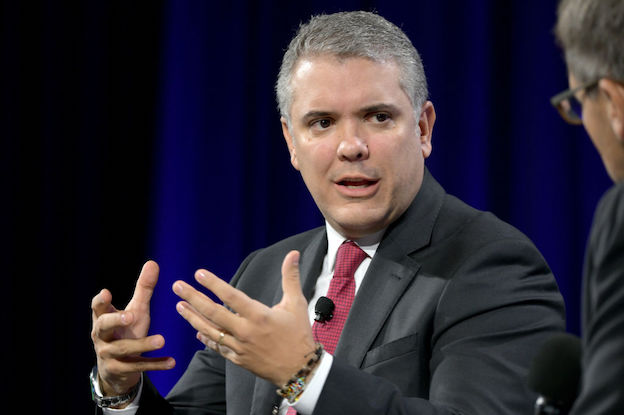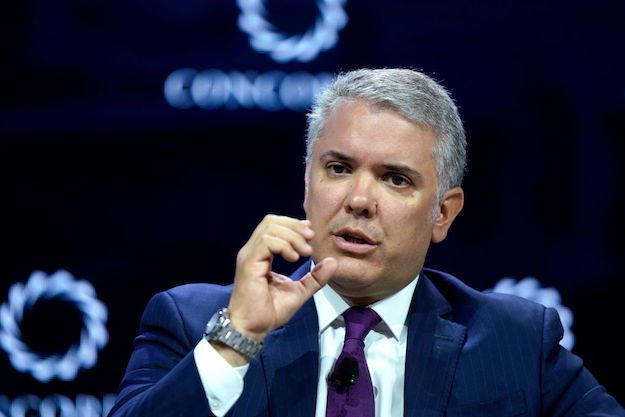This article has been updated.
Colombia’s President Iván Duque campaigned on a promise to ignite the economy through entrepreneurship. By the end of 2018, he had raised funds on the bond market for creative economy startups and incentivized small businesses with tax breaks. It seemed like the economics-savvy leader was cruising along – until a blizzard of budget problems buried him up to his chin.
The administration is now struggling to meet its fiscal deficit rule, a budget target written into the constitution and watched carefully by investors and credit rating agencies. As Duque looks for ways to shore up Colombia’s finances, observers and some in the administration have suggested he may be forced to privatize government holdings in national champions like Ecopetrol, the state-controlled oil firm.
Duque’s finance minister, Alberto Carrasquilla, told reporters in January that the administration is mulling what it could sell from a list of 100 companies in which the government holds shares worth a total of around $50 billion. On May 14, Bloomberg reported that the government was preparing to sell some or all of its 51% stake in electric utility ISA, a sale that would be worth some $2.7 billion. Further sales of state assets are expected.
However necessary, privatization carries significant political risks – and could shake up Colombian elections well into the future.
“Duque … would be wary of the likely backlash from growing leftist forces when considering privatizing these assets, especially with local and regional elections in October,” said Antonia Eklund, a senior analyst at Control Risks, a political risk consultancy. “In the scenario that partial privatizations advance under Duque, it would likely serve as fodder for the left’s agenda in 2022.”
Duque may not have a choice. Already under strain, Colombia’s fiscal outlook has been complicated by large-scale migration from Venezuela. As the government searches for new sources of tax revenue and clamps down on tax evasion, it is also now being forced to factor in the future costs of treating Venezuelan migrants in emergency rooms and supporting their children in classrooms across the country.
“Unfortunately, as a country, we haven’t figured out how to finance these constitutional obligations,” said Nelson Vera, an economist at ANIF, a think tank in Bogotá.
The UN projects that Venezuela’s diaspora will reach 5.4 million by the end of 2019, up from 3.4 million at the end of 2018. At that rate, Colombia could become home to at least 2 million refugees by the end of this year. Last year, Duque estimated Venezuelan refugees would cost Colombia half a percent of GDP per year, or about $1.5 billion. Control Risks thinks the cost of Venezuelan refugees this year could be north of 0.6% of GDP.
If Duque does ultimately opt to privatize, the most likely target would be a 10% to 12% stake in Ecopetrol, according to Control Risks. That would shore up the government’s finances in the short term, but would come with several complications.
Privatizing a crown jewel like Ecopetrol or ISA, the state-controlled transmission firm, would likely be met with staunch resistance. Ecopetrol is a profitable company and its unions, which want full nationalization, would likely politicize the sale. That could give nationalist factions on both sides of the spectrum power.
“Duque has failed on his campaign promise to overcome polarization, since moving further to the right and strengthening the likelihood of a leading leftist candidate of the ilk of Gustavo Petro in 2022,” Eklund said. “A botched privatization process would contribute to the consolidation of the latter.”
Another problem is that Colombian law says the government must keep at least 80% of its stake in Ecopetrol. Depending on how much money it needed to raise, that could push the administration to try to change the law or sell other assets, like shares in ISA. Duque would have to fight for his right to sell in Congress, where he is so far unloved.
Past experience shows that privatization in Latin America has come with political consequences. In the late 1990s, the World Bank loaded pressure onto Bolivia to privatize water supply and sanitation infrastructure in order to keep their loans. Then-President Hugo Banzer met fierce popular protest from students and unions, among them the coca growers union. A key figure during the spat was Evo Morales, who won the presidency in 2005 and has held power ever since. Privatizations were associated with economic mismanagement in the 1990s in Argentina. That led former President Cristina Fernández de Kirchner to re-nationalize the former state oil company YPF in 2012. In Colombia, the worry is that a nationalist government would scare away foreign investment.
Low approval ratings will not make privatization easy for Duque. Any privatization effort will likely be unpopular and meet legal action. Former President Juan Manuel Santos launched the sale of a controlling stake in Isagen, a state-run power utility, in 2013. It dragged on for 30 months before the transaction with Brookfield, the buyer, closed. That’s time Duque does not have. Looking ahead, Duque’s party is hoping to gain popularity as they head into local and regional elections in October of this year.
Duque could actually take a tip from the Isagen sale, which Santos successfully executed in the face of popular resistance. The $2 billion it raised helped capitalize Colombia’s FDN, a local financing institution for the country’s much-needed infrastructure upgrades. Part of the Isagen privatization success came from Santos selling it as a good deal: Colombians would get better roads in exchange for giving up the utility. ANIF, a Colombian think tank, thinks Duque should do something similar. It will be key for Duque to show the public that he’s trading in public assets for more than just some extra pocket change.
While a tax reform passed at the end of 2018 put the deficit on track for 2019, it’s 2020 and beyond that could present a problem. Congress in April relaxed the fiscal rule from 2.4% of GDP to 2.7% of GDP. That buys them some time. The finance ministry also wants to do everything possible to resolve the remainder of the budget shortfall with debt financing before they take a step toward privatizations. ANIF argues that no matter what, Colombia needs another tax reform to stabilize its public debt in the long-term.
Meanwhile, the state has grown the public debt by 12% each year for the last 10 years, and many in Bogotá worry that taking on more debt is unsustainable. In spite of the political risks, the pressure is on to privatize. After all, it doesn’t seem that the costs of Venezuelan migration are going to let up anytime soon.
This piece was updated to reflect news that Colombia’s government was preparing to sell its stake in the electric utility ISA.
—
Tomaselli is a freelance journalist and researcher based in Colombia







